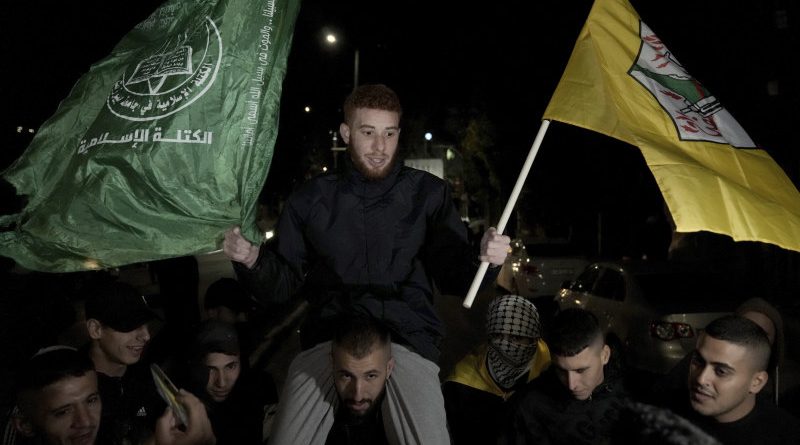Freed Palestinians were mostly young and not convicted of crimes
Save articles for later
Add articles to your saved list and come back to them any time.
Israel released a total of 240 Palestinian prisoners and detainees in exchange for 105 hostages freed by Hamas during a weeklong pause in hostilities, an arrangement that diplomats had tried to extend before it collapsed into fighting Friday morning.
An analysis of data on the Palestinians released showed that a majority of them had not been convicted of a crime. There were 107 teenagers under 18, including three girls. Another 66 teenagers were 18 years old. The oldest person released was a 64-year-old woman.
A Palestinian man is carried on the shoulders after being released from prison by Israel, in the West Bank town of Ramallah.Credit: AP
The negotiations for the seven rounds of exchange – one for each day of the pause – had centred on women and children on either side of the conflict. Citizens of Thailand, the Philippines and Russia, who were freed through separate talks, also numbered among the hostages Hamas released. More than 120 hostages are believed to remain in the Gaza Strip.
The Israeli government initially posted a list of 300 Palestinian teenagers and women who could potentially be released through the deal and added 50 names to that list as the exchanges progressed. The list included people’s birth dates, the accusations levied against them and other information. Among those who had not been convicted of a crime, it did not distinguish between those imprisoned without formally being charged and those who had been charged and were awaiting trial.
The New York Times compared the Israeli data with lists of the Palestinians released each day by the Palestinian Authority’s Commission for Prisoners’ Affairs. The Israeli data shows that three-quarters of the released Palestinians had not been convicted of a crime. Most had been in prison for less than a year; 37 were arrested during the Israeli military’s crackdown after the October 7 Hamas-led attacks on Israel.
Israel detained all of the people on the list for what it said were offences related to Israel’s security, from throwing stones to more serious accusations like supporting terrorism and attempted murder. More than half of the cases were being prosecuted in Israeli military courts, which try Palestinians in the occupied West Bank but not Israeli settlers who live there.
Nearly all Palestinians tried in Israeli military courts are convicted, and those accused of security offences can be imprisoned indefinitely without charge or trial. Israel has defended these practices as necessary for maintaining its security, but international human rights groups have widely criticised them as violating international law and said they are used to suppress Palestinian political activity and expression.
A majority of the people released, 155 of them, were from the West Bank; 72 were from East Jerusalem; and one was from Gaza. The lists also included some Palestinian citizens of Israel, who are not normally included in exchange deals. That raised alarm among some observers who feared their inclusion could be used to tie them to Hamas or to threaten revoking their citizenship.
This article originally appeared in The New York Times.
Get a note directly from our foreign correspondents on what’s making headlines around the world. Sign up for our weekly What in the World newsletter.
Most Viewed in World
Source: Read Full Article


